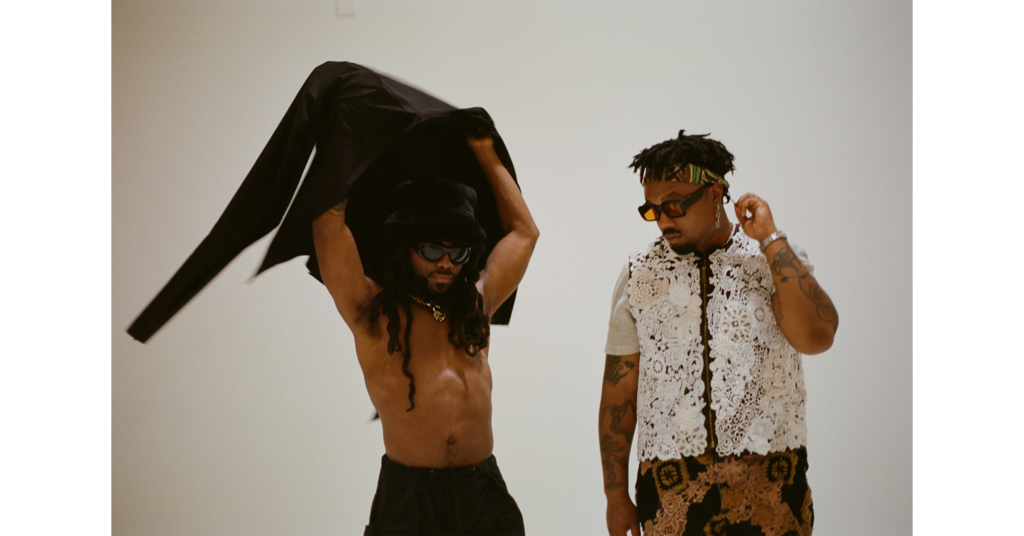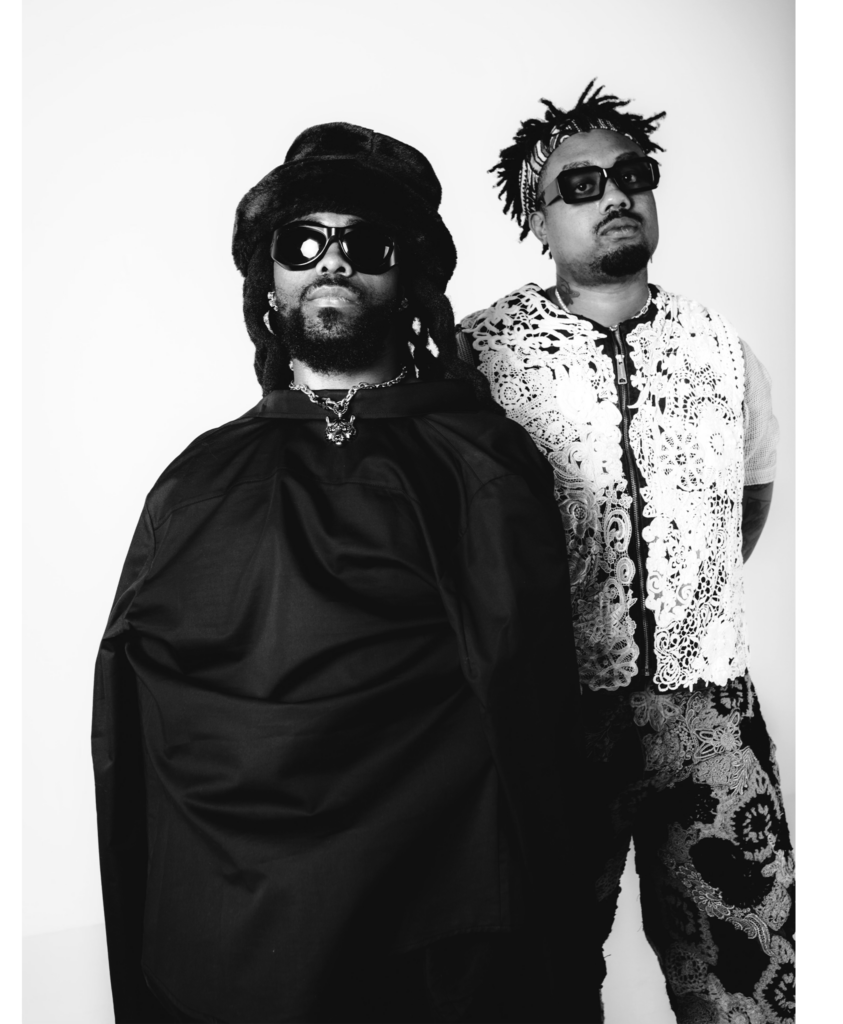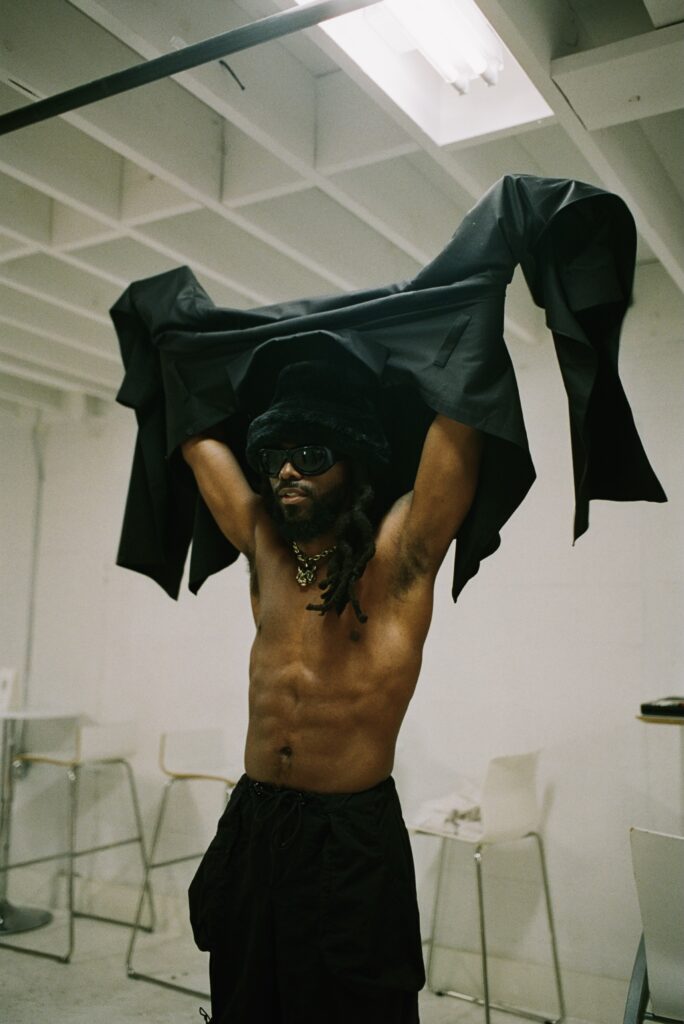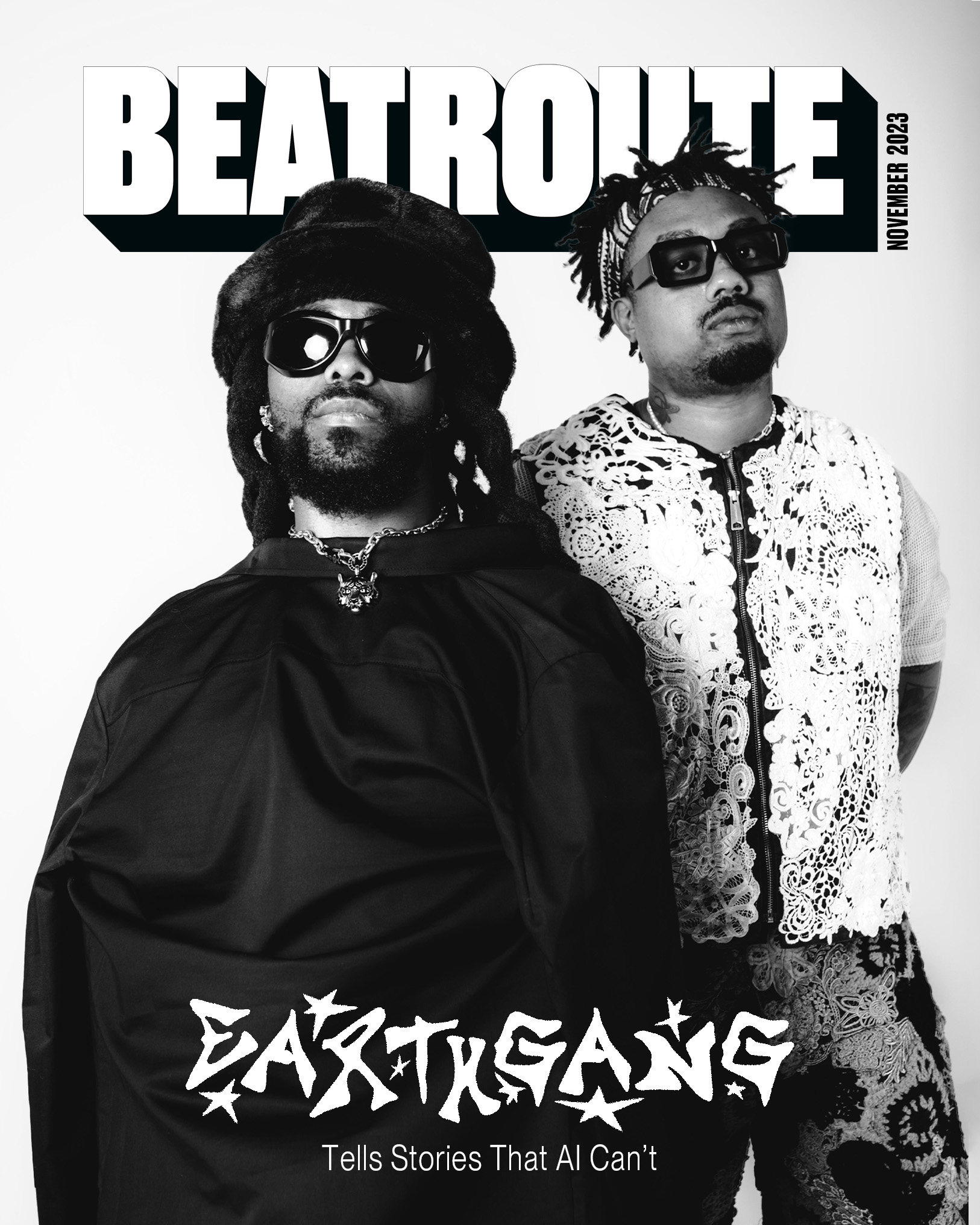COVER
EARTHGANG
Tells Stories That AI Can’t
By Emily Rosati
Publishing date: Nov 03, 2023
I
In a dance between binary code and humanity, you’ll find EARTHGANG, who emanate a mirrored dichotomy of electricity and earthy authenticity. These sonic alchemists and Atlanta natives, comprising of Olu (a.k.a Johnny Venus) and WowGr8 (a.k.a Doctur Dot, born Eian Parker), stand as defiant champions of human creativity in a landscape increasingly dominated by algorithms and digital automation. Signed to J. Cole’s Dreamville Records in 2017, they have consistently pushed the boundaries of their craft, remaining true to their artistic roots, not in sound but rather, “Being as honest as possible in a given moment, open to the energies and creativity that’s coming through us from the universe,” they tell me.
EarthGang’s evolution in the contemporary hip-hop scene was nothing short of revolutionary. Their discography, which includes Mirrorland, Strays with Rabies, and GHETTO GODS, showcases a fusion of southern hip-hop, soulful melodies, introspective lyrics, and genre-bending production. The duo continues to defy conventional norms on their latest EP EarthGang vs the Algorithm: RIP Human Art, boldly challenging the encroachment of algorithms on creativity. Now, hold up, this is not another critique or cautionary tale about AI. Instead, EarthGang leans in, embracing the realities of technology and its use, philosophizing on possible futures while still prioritizing the “dopeness of humanity” at the core of their creations. In fact, they place utmost importance on genuine human artistry and innovation, championing this ethos by being wholly themselves, standing defiantly in their talent and coolness.
Coming to me from New York, the hip-hop duo unpacks EarthGang vs the Algorithm: RIP Human Art, the first installment of an innovative trilogy where they explore where the digital and divine collide, providing an immersive experience that transcends the ordinary and celebrates the extraordinary. The conversation is as much of an explorative journey as their cinematic projects are. With curiosity taking a front seat, we talk about impermanence, absolution, and what is inherently human and simply cannot be replicated. While we don’t necessarily come up with many answers, we insist on asking a lot of questions.
—
In a dance between binary code and humanity, you’ll find EARTHGANG, who emanate a mirrored dichotomy of electricity and earthy authenticity. These sonic alchemists and Atlanta natives, comprising of Olu (a.k.a Johnny Venus) and WowGr8 (a.k.a Doctur Dot, born Eian Parker), stand as defiant champions of human creativity in a landscape increasingly dominated by algorithms and digital automation. Signed to J. Cole’s Dreamville Records in 2017, they have consistently pushed the boundaries of their craft, remaining true to their artistic roots, not in sound but rather, “Being as honest as possible in a given moment, open to the energies and creativity that’s coming through us from the universe,” they tell me.
EarthGang’s evolution in the contemporary hip-hop scene was nothing short of revolutionary. Their discography, which includes Mirrorland, Strays with Rabies, and GHETTO GODS, showcases a fusion of southern hip-hop, soulful melodies, introspective lyrics, and genre-bending production. The duo continues to defy conventional norms on their latest EP EarthGang vs the Algorithm: RIP Human Art, boldly challenging the encroachment of algorithms on creativity. Now, hold up, this is not another critique or cautionary tale about AI. Instead, EarthGang leans in, embracing the realities of technology and its use, philosophizing on possible futures while still prioritizing the “dopeness of humanity” at the core of their creations. In fact, they place utmost importance on genuine human artistry and innovation, championing this ethos by being wholly themselves, standing defiantly in their talent and coolness.
Coming to me from New York, the hip-hop duo unpacks EarthGang vs the Algorithm: RIP Human Art, the first installment of an innovative trilogy where they explore where the digital and divine collide, providing an immersive experience that transcends the ordinary and celebrates the extraordinary. The conversation is as much of an explorative journey as their cinematic projects are. With curiosity taking a front seat, we talk about impermanence, absolution, and what is inherently human and simply cannot be replicated. While we don’t necessarily come up with many answers, we insist on asking a lot of questions.
—
You are judged by a different set of rules after you die. You’re not judged as a human anymore, but a spirit, and that changes people’s relationship to who you are and the energy you put out into the world.
You are judged by a different set of rules after you die. You’re not judged as a human anymore, but a spirit, and that changes people’s relationship to who you are and the energy you put out into the world.
RIP Human Art, as a concept, challenges the dominance of algorithms and embraces human creativity. You lean in to AI and the future realities where people can use it as a tool and integrate it into creative practices. Can you tell me about the inception of this idea and elaborate on the philosophy behind this project?
Olu: That was basically the idea, yeah, to draw attention to — you can call it a crisis if you want — what’s going on in the world right now revolving around human creativity. Whether it’s writers, actors, artists, painters, or directors — all of these industries are being threatened or finding a way to adjust to the introduction of artificial intelligence and technology. We believe the coolest way to do this is to find a way to use and integrate it into the human creative experience and make sure the dopeness of humanity is always still at the core of everything we create.
While this EP is conceptually informed and holds profound lyricism, the production of your songs remains robust, they’re explorative and genre-agnostic. How do you uphold this level of quality, without sacrificing any part of a song’s structure?
WowGr8: It’s really about keeping the spirit of fun. As long as it’s fresh and exciting as you’re creating, that translates into the music, for me.
How do you maintain that and keep it consistent?
Olu: I know for me, personally, it’s to always approach everything with a beginner mindset. It may not be the first time I produce, but it could be the first time I approach it this way. Or use elements I’ve used before but in a different way. So, everything is a first-time experience. With that, it gives you the freedom to try things and be daring, go against the grain. The production, all five songs, is so completely different. And, they were done by a core of producers that we work with all the time. They’re familiar with the complexities and changes in our music, and our nuances as people, so they’re able to pull these energies out and create a palette of life. We never went into it like, ‘We want our music to sound like this.’ We want our music to give you this feeling. And that feeling also may change.
What you are describing sounds like such a genuine creative process. It’s intentional and organic, creativity is just flowing through you.
WowGr8: Gotta keep it flowing!
The opener, “The Wake”, and “Die Today” both explore the impact of impermanence. Less about the impact of technology, and more so, exploring the idea of human impermanence.
Olu: The inspiration behind those songs was real-life situations, you know what I’m saying? Where you’re processing grief. One guy from our touring party’s parent and one of my best friends’ father passed. It was kind of just in the air. It ended up being a larger thing. Right now, a lot of people are dealing with some type of grief and letting go. I’ve seen people scared that their jobs would be let go because AI is taking over their jobs. Or asking why they should create and be artists if they need to spend all their time making TikToks or content. I’m personally not a content creator, I’m an artist. A lot of people were coming to grips with change. We use death a lot but it’s really just change. A change of interaction. “Die Today” talks about impermanence. In our space, as creators, when people die, that’s when they get their roses or are shown the most love. That’s when people allow them to be great. We don’t want that to be the case with human creativity. We don’t want AI to officially take over. Like the actors still in their strikes, we’re saying [to] value us, our potential, and what we bring into the world while we’re here.
To your point, sometimes people, once someone’s passed, suddenly think about them differently. Is death providing absolution?
WowGr8: Have you ever watched the show Adventure Time? There’s an episode where Finn and Jake are talking about death and Jake is explaining to Finn that when you die, your consciousness kind of emits through the air and spreads, and everyone takes a breath of it and then understands you. I’ve always kind of felt it was like that. Even from being a kid and seeing celebrities die and all of a sudden did something that was worth something and had value. We see it all the time. Nipsey had a big fan base and was huge, but now the world knows his principles and his life. It’s like in order to get to the next portal, beyond whatever this life is, you explode on the way out.
Olu: I also think that you are judged by a different set of rules after you die. You’re not judged as a human anymore, but a spirit, and that changes people’s relationship to who you are, what you did, what you accomplished, and the energy you put out into the world, whether that was positive, negative, or anything in between. I think people judge your energy and vibrations and not necessarily you, as a human being.
Not to be corny, but, we go out like stars.
WowGr8: It’s not corny, it’s what happens!

Where do you feel AI could enhance our creativity and which aspects of our creativity do you feel are inherently human and cannot be replicated?
WowGr8: We know it can enhance quantity. Sometimes, the trickle effect of what happens when you get more is possible. There might just be a bunch of different ways to bury the mind. I think the thing that makes the art that people make so connecting is the details around what’s going on. If it’s a picture of a sad kid — you could get an AI picture of a sad kid, they’ll make the eyes look sad and go hard for that but, you get a picture of a sad kid that I might paint and you might see the mom crying, or have broken bottles somewhere. There’s something else in the painting that evokes a whole emotion. Those things come from memories and experiences. AI can get super close, but I don’t think the value will come across.
Olu: AI can never replicate the human storytelling experience. You could tell the same story and it would be completely different. You could tell the same story 365 days of the year and it could be completely different. The beauty in human storytelling and pulling from our memories and experiences is the one thing that I would never want to see AI try to replicate. Now, in other cases, when it comes to workflow and categorizing things, making things easier to pull for references, stuff like that, AI could do that and it would be fire. Like, I want to see this type of movie from this country and this era, for inspiration, that would be fire. But, I don’t want to watch computer stories.
WowGr8: It would be interesting to see as they get better. That’s the one thing that concerns me about AI — not even concerns, but interests me — is the fact that it is developing, it’s learning, it’s getting better. As it gets stronger, if we as a collective, humans, aren’t getting mentally stronger, we will get lost in the blur. Where do these points intersect? Who the hell knows, I don’t think it’s necessarily going to be the worst thing but I wonder if it has a ceiling. Or do we have a ceiling? And is that the same place?
I find it interesting you said that and I think about this a lot. If AI can be a tool that frees up our time from doing tedious things, we could spend time that has a more meaningful innovative impact. But, I also question the way we’ve become addicted to stimulation and technology. I wonder if we’d use the extra time meaningfully.
WowGr8: What is meaningful? To do what? Who knows, everyone has a different definition. If AI questions its existence or questions God, is it sentient? I was just wondering what you think but I don’t mean to flip it on you.
I sometimes think of our brains as our own little machines or robots. If an AI can, let’s say, talk about a traumatic experience, and mimic real human emotion or nuanced feelings that they’ve downloaded from real people, how can we tell the difference? And what constitutes being a sentient being? And what doesn’t? This is what I love about philosophizing — there are often no answers, it’s about how many possibilities you explore, or the closer you can get to “truth”.
WowGr8: And I think that’s the whole point of our project. To not give answers but ask questions.
Speaking of asking questions… “Imagine” envisions an idealistic future, and in a way, also highlights imperfections of that. I find it particularly interesting that you also point to real-life tangible ideas and things that society could prioritize, like free healthcare. Tell me about this track. How did these messages come to fruition?
WowGr8: “Imagine”, produced by Natra Average, my homie, was, like many songs, started because you’re playing video games and thinking about what life could be and just opening up your mind. I started with the lyrics, “Paradise at your fingertips,” perpetuating an idea of — when is it ever going to be perfect? Are we close? Have we always been close? Is it getting closer? What does it mean? What does perfect look like in the first place? Before you can imagine what it is, you imagine, is this not it now? Painting the picture around that first thought.
It’s like EARTHGANG’s version of “21 Questions” by 50 Cent.
Let’s talk about “Bobby Boucher”. First off, why Waterboy? Where did that come from?
WowGr8: It’s one of the greatest movies ever made! That’s just it. There was good energy in the studio that day, we were just vibing.
You mentioned you studied Adam Sandler for the treatment and execution of the video, what does that look like?
WowGr8: That looked like watching a bunch of different Adam Sandler movies, watching his quirks and how to repurpose them. I watched that movie in particular about three times. At first, just watching it, then with the song on loop. Then, I watched a couple of his other movies. Then, I watched Ying Yang Twin videos and took a lot of elements of Bubba Sparxxx. Since Adam Sandler is a part of my childhood, I started taking a bit of everything from that part of my life.
Olu: Ludracris videos too. He had crazy, highly energetic videos, from that same era. We wanted to inject that energy into the song and the video.
You’re always incorporating a winking sense of humor into what you do. I really want to know about the Hulk Hogan and Captain Insano cross-over reference from the music video. What happened there?
WowGr8: That’s actually hilarious. I was in wrestler mode at the time. I didn’t mean to throw a “Brother” in there. I meant to get into Captain Insano and then a little Macho Man Randy Savage but then Hulk Hogan just came out.
Olu: Can’t hold the Hogan, man!
What were your reactions when Adam Sandler gave you guys the stamp of approval?
WowGr8: Lost it, lost my mind. It was crazy, like winning American Idol or some shit or getting the golden buzzer. I still can’t believe that.
That in itself is a whole accomplishment.
WowGr8: We won an award that I wasn’t screaming for like I did for that.

It creates a greater challenge for the artist and storyteller to be as unique and authentic as possible.
Do you think AI helps democratize art by enabling more people to create and use tools that are accessible to them or does it risk homogenizing artistic expression?
WowGr8: I think it’s both.
Olu: Definitely both. Of course, it comes with the risk of homogenizing, like you said, making everything the same. But, that burden should be on the artist to find different inspiration and tell truer stories, spending the time to get to know themselves better. Of course, if you’re listening to what everyone puts out and be like them, it’s going to become even more homogenized but it creates a greater challenge for the artist and storyteller to be as unique and authentic as possible.
WowGr8: The kind of good thing you could say about everything going to a homogenous place is that the people who stand out and make something different, truly stand out. Especially if, let’s say, [if] the average or mediocre get all the money, it’s going to make you more creative to approach the concept of what you do. How do we even approach the concept of music as a whole? We’re seeing that now, it makes you take a whole step back and get big picture with it. Like, instead of dropping an album, let’s bring it down, put it out in EPs, do these types of songs, bend what the genre is… It makes you think about the dimensions of what you’re working with. That’s if you want to be creative, it pushes you to that place, and I think that’s a good thing.
What do you think the audience or listener’s role plays in validating AI-generated art? How do you think that affects our perception of its authenticity?
WowGr8: It’s hard to say. There’s always going to be an audience for AI, and there’s always going to be an audience for the other stuff, and an audience who be liking everything. It’s hard to say, as much as you want to serve your audience, you can’t chase the demand.
Have you listened to any of the AI-generated music that people put out recently? Most of it isn’t great but there was one Weeknd song that was questionably good.
Olu: The one with Drake? You liked that?
I remember listening to it and wondering if it was a little bit good.
Olu: That’s why I didn’t like it. Because it was a little bit good.
WowGr8: I need them to drop one that they don’t tell us the truth about, and to come back later and be like, aha, got you! If you know it’s AI, it’s harder to appreciate it. It’s like watching wrestling and knowing it’s fake, you can enjoy it for what it is.

If you had a clone, that was the same as you down to the last cellular detail, is it you or not you?
WowGr8: Where did he come from? Where did he grow up?
He has all your cells, all your memories. Everything is the same.
WowGr8: My memories too? Did he experience those memories?
Olu: Nah, he not me. Because he ain’t come out my mamma.
WowGr8: Are we thinking the same thoughts all the time?
I mean, that’s where it can get interesting because in the moment of creation, you are the same, but a second after, there are a million possibilities of the choices you may make.
WowGr8: If we’re not thinking the same things at the same time, we’re not the same. If you’re me, you gotta be all the way there. We gotta be doing the exact same thing all the time, thinking the same things. If there’s just a double of me, that’s hilarious, but that ain’t me.
What can we expect from your upcoming EPs of your RIP Human Art series?
WowGr8: Cinematic sounds. Cinematic sounds, man, it’s going to be very musical.
Olu: It’ll be digital. Pull out your popcorn and 3D AMC glasses.
Photographer: Shamaal

